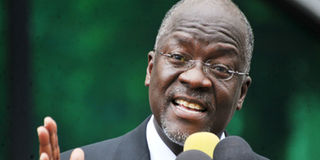Magufuli's sugar headache

President John Magufuli
What you need to know:
The sudden surge in sugar prices, coming only six days after Dr Magufuli introduced the import curbs, would serve as a rude awakening to the new president as he seeks to bring sanity in the sugar production and marketing industry.
Dar es Salaam. President John Magufuli may have had good intentions in restricting sugar imports but it seems his decision has rekindled the politics that has beset the lucrative business over the years at the expense of the consumer.
The sudden surge in sugar prices, coming only six days after Dr Magufuli introduced the import curbs, would serve as a rude awakening to the new president as he seeks to bring sanity in the sugar production and marketing industry.
Some industry players were quick yesterday to lay the blame on marketing cartels for creating an artificial shortage of the commodity to try to force a rethink of the government’s strategy.
Other analysts, however, believe it was the work of ordinary suppliers taking advantage of a reported shortage of the sweetener among the major producers in the country to reap super profits during the import lull period.
Yesterday, the Kilombero Sugar Company board chairman, Mr Amy Mpungwe, told The Citizen that he believed the jump in prices was the work of sugar cartels unhappy with Dr Magufuli’s intervention.
“I wonder why this is happening…I believe it is the work of cartels...the four local producers have some 50,000 metric tonnes of sugar in their warehouses, enough to meet the country’s demand for at least two months,” Mr Mpungwe said.
He suggested that the cartels may be disrupting the supply chain in a desperate attempt to send a message ahead of the government’s planned issuance of import permits. According to Mr Mpungwe, local producers met Prime Minister Kassim Majaliwa on Tuesday and discussed ways of restoring order in the sugar sector.
“We agreed that instead of leaving the import business to traders, Kilombero, Mtibwa, TPC and Kagera Sugar should be the ones to import the sugar,” he said. He accused other importers of using the permits to bring in cheap sugar in the market, frustrating further investment by existing manufacturers for the benefit of local farmers.
The PM’s Office was given the mandate to work out a formula for the issuance of the import permits from State House as directed by the President. It is understood that the permits would be issued any time from now.
A dealer in the business who talked to The Citizen on condition that his name is not published in the media said the state was only receiving advice from players who competed with them for the same business.
“Mtibwa and Kilombero factories are closed and TPC in Moshi and Kagera Sugar all have inadequate stocks, but they are claiming to have adequate stock that is not in the market,” said the trader, adding that the producers only wanted an opportunity to establish a monopoly. Mr Mpungwe confirmed the two factories were closed over lack of sugar cane.
“It appears they have won over the government to be the sole importers of sugar but things will backfire soon as a monopoly can only hurt hapless consumers,” the trader said.
He said the state should allow free competition for the sugar import quotas. “If the producers prevail, they sector will sink into the Kenyan example where factories ignored the development of farms and turned into mere importers and distributors of sugar. The whole sector will suffer and in the end Dr Magufuli will not achieve his aim.”
Sugar import cartels are being blamed for the near-collapse of the Kenyan sugar sector as dumping of cheap sugar means local factories cannot compete favourably. The lucrative import business is said to be run by a powerful cartel of local and international traders, who have control of government machinery and have also roped in influential politicians to their side.
The raw power of the cartels was exhibited last year when Kenya and Uganda had a trade standoff over sugar exported from Uganda to Kenya. President Yoweri Museveni threatened to derail business with Kenya if it blocked its traders (Ugandan) from exporting the commodity there.
Kenya had argued that Uganda was not a net producer of sugar to raise the surplus for export, with reports indicating importers had brought pressure on Museveni to act on their behalf. Kenya is currently cracking down on sugar barons who have also been importing the commodity without paying tax.
It is perhaps this scenario that President Magufuli envisioned when he warned his government would not allow unscrupulous traders to mess the sector and jeopardize the interests of farmers as well as thousands of jobs in the factories. He said imports of cheap sugar was also a health hazard to consumers.
He stressed that in his drive for industrialisation, he would like to see local producers thrive. He accused corrupt government officials of misusing the permits.
Yesterday, University of Dar es Salaam lecturer Humphrey Moshi said he was not surprised that sugar prices had jumped as soon as the move to control import permits was announced. “It is not something strange as that is the way business people operate. I would say what we are seeing now is just market speculation and what the state should do is to ensure the local producers have the sugar in the market in quantities that will defeat hoarding,” said Prof Moshi.
A market survey in Dar es Salaam, Morogoro and Mwanza show prices continued to rise as shops quickly ran out of stock. Panic purchases was also being blamed. Wholesale prices went up by about Sh5,000, to reflect a Sh200-Sh300 retail rise.
Industry, Trade and investment Minister Charles Mwijage on Wednesday issued a stern warning against traders who are raising sugar prices. He likened them to economic saboteurs, warning that the government would not tolerate them.
“The good thing is that we know all the go-downs, where sugar is kept…we will conduct a serious search and those who will be identified as doing contrary to what we expect them to do, will not go scot-free,” he said.
Tanzania’s four sugar factories, namely Mtibwa, Kilombero, Kagera, and TPC produce about 300,000 metric tonnes of sugar per year against the country’s consumption demand of 420,000 metric tonnes, leaving a gap of 120,000 metric tonnes which is filled by imports.
With sugar politics resurfacing, the Tanzania Sugar Board is expected to speak on a number of issues about the commodity in Dar es Salaam today.




